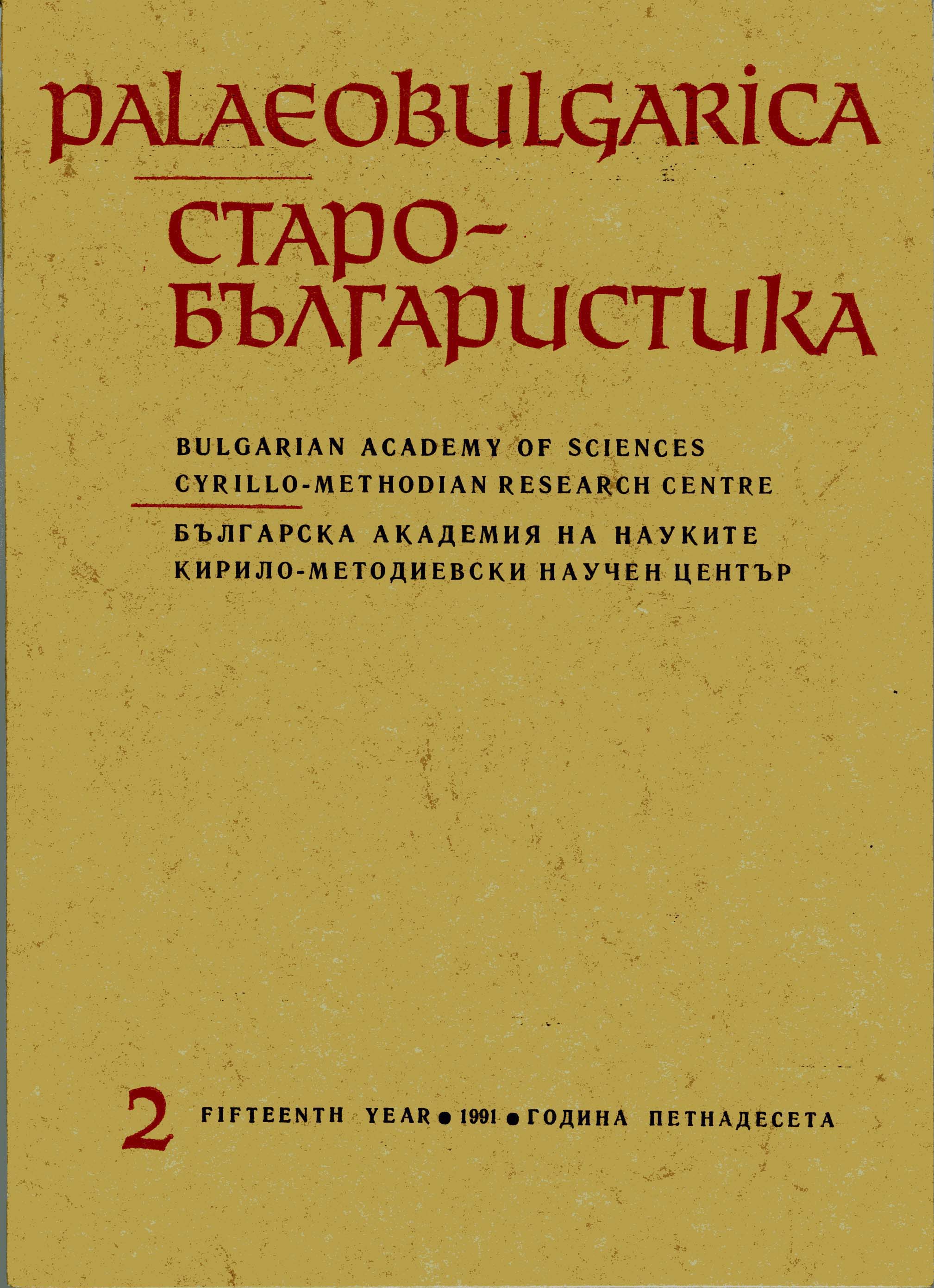
We kindly inform you that, as long as the subject affiliation of our 300.000+ articles is in progress, you might get unsufficient or no results on your third level or second level search. In this case, please broaden your search criteria.

In this article is presented a part of correspondence between Ukrainian Academic Oleksa Myšanyč and Mikola Kočiš, a linguist and writer from community of Rusyns of Bačka (Vojvodina, Serbia). Published documents allow to know more about the relationship between two prominent figures, about the events in the Rusyns community and about the scientific work of M.Kočyš.
More...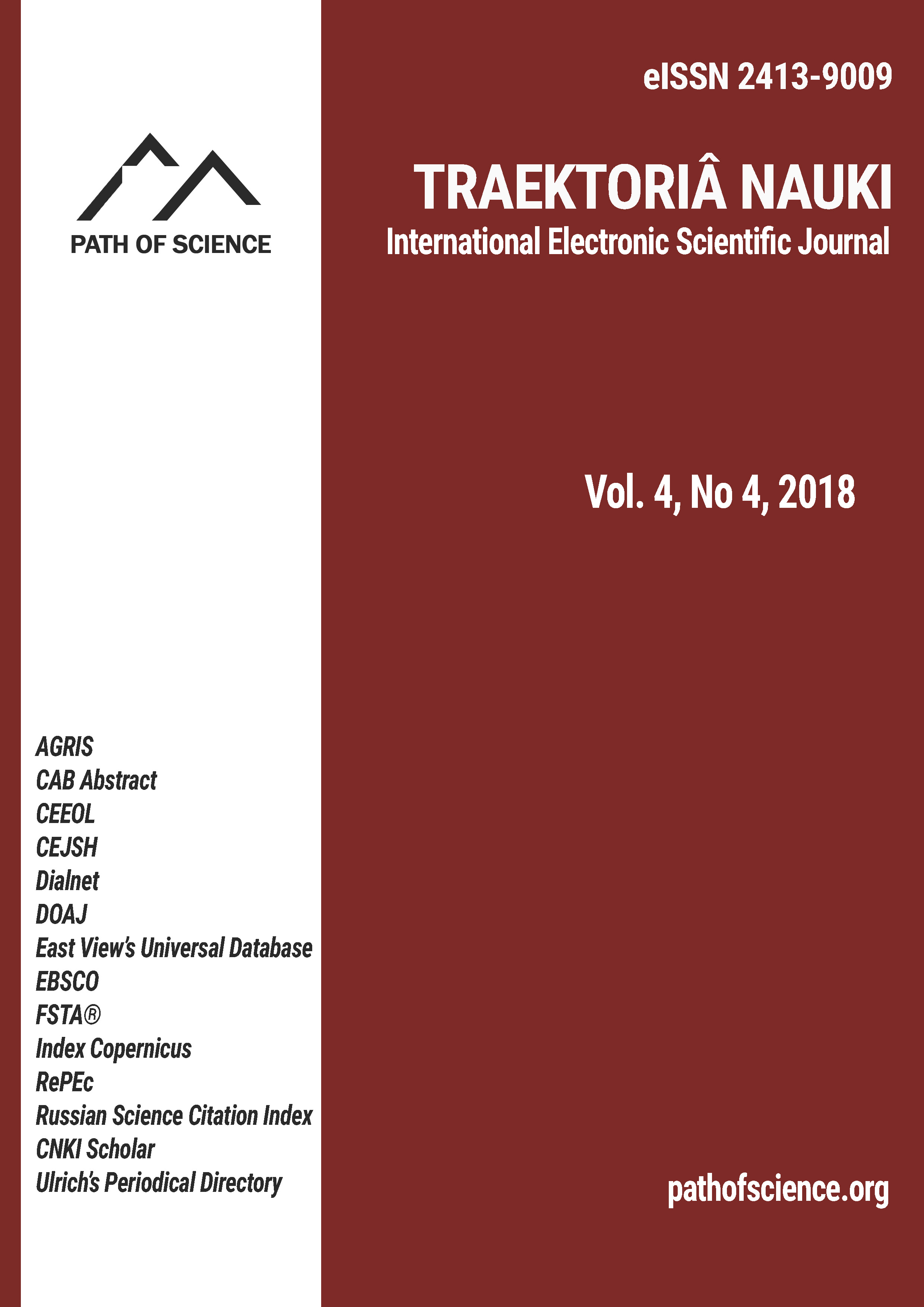
The article is devoted to the study of intonation patterns of expressions, to detection of their specificity in poetic language. The paper analyzes the syntactic level of the statements of poetic texts, which is essential for the formation of a figurative system of man. The purpose of the article is to identify syntactic means that are essential for the style of the author of the work of art.
More...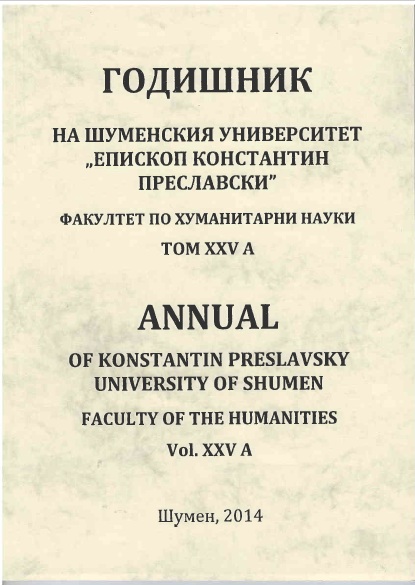
The article focuses on the system of appelatives used in Mikhail Zoshchenko's early short stories. It discusses the positions of appelatives in the texts and the elements of wordplay used by the author.
More...
The article analyses Old Russian texts of XI - XVII centuries. It reveals what forms are taken by eccliseonims as a type of religious vocabulary in the process of functioning in written speech. The article also discusses the interaction of oral and written speech in the Middle Ages
More...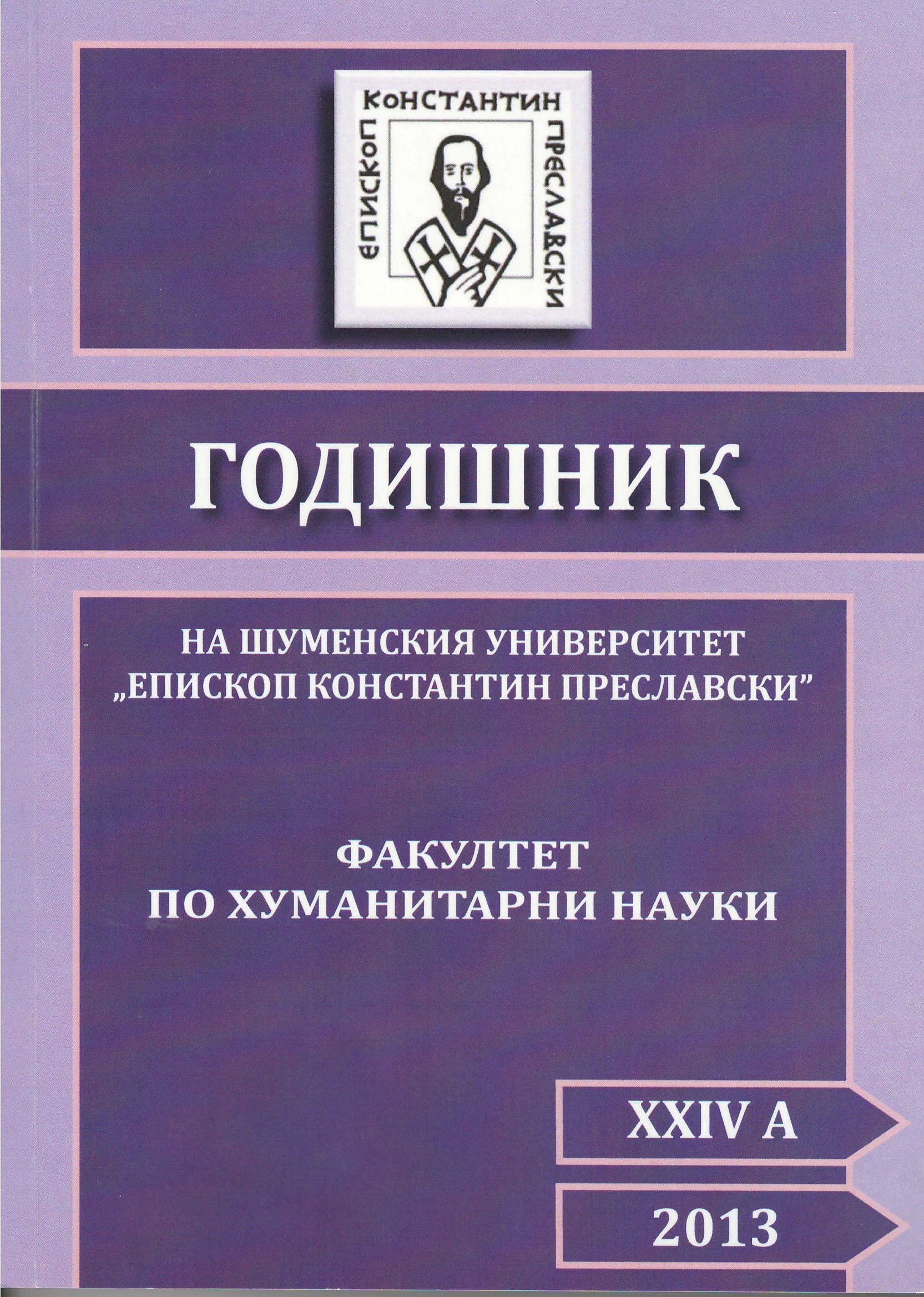
The paper focuses on the semantic category 'size- dimension', on the specifics of absolute and relative linguistic size and, in particular, the linguistic interpretation of the size in the light of normative evaluation. Linguistic structures interpret the size of the objects in relation to four different kinds of norms: the norm of kind (the average standard in the representation of the size feature), the situational norm, the norm of proportionality and the norm of expectation. Each one of these norms has its own linguistic representation. The object of description and analysis in the present paper are the structures reflecting the size with respect to the situational norm, the norm of proportionality and the norm of expectation in Russian language.
More...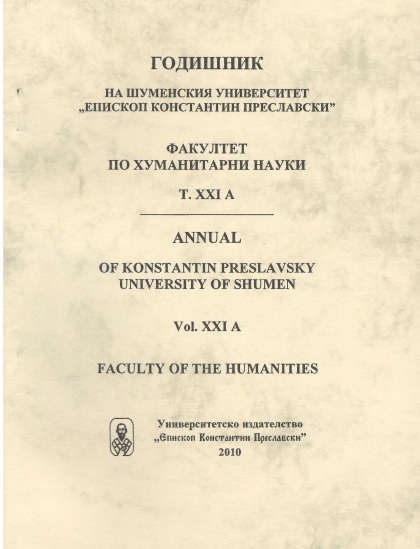
In the conversational speech we express positive and negative emotions and attitudes to all kinds of referents. The clean tongue and the bad language are present in the different cultures. For this reason in the article are represented verbal means of euphemisms and dysphemisms, the cycle taboo-euphemism in the german linguistics studies and the these of a kaleidoscope taboo-euphemism- dysphemism, based on the opposition of euphemisms and dysphemisms.
More...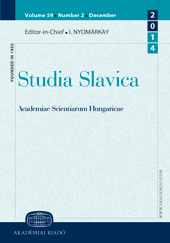
The author presents a historical-etymological analysis of two Russian words – kunžut ‘sesame’ and xamovnik ‘weaver’. According to her argumentation, Russian kunžut has Tokharian origin, it was borrowed from Tokharian A by Old Uygur before the 12th century. From Old Uygur, it was intermediated by Middle Mongol and Middle Kipchak to Russian. Xam, the stem of xamovnik is preserved in one of the Old Novgorodian birk barch letter from the beginning of the 14th century. It was borrowed from the Cantonese dialect of the Chinese language by West Old Turkic, and a West Old Turkic form was borrowed by Old Russian.
More...
The aim of the present paper is to describe Sándor Bonkáló’s research in the field of Ukrainian language and dialectology, to emphasize the importance of his approach to the definition of the place of Ukrainian among other East Slavic languages, to outline the characteristic features of Bonkáló’s investigations in the field of Hutsul dialects and ethnography as well as to focus on the role of Bonkáló’s research in the development of Carpathian Ruthenian literature and culture.
More...
The classification of present-day Russian according to the Extended Projection Principle (EPP) has been a widely discussed issue in the theory of minimalism. The investigation of Old Russian texts suggests that the realization of the EPP requirement differed in Old Russian and has been subject to parametric variation. In the present study, the author tries to shed light on this change by looking at the relative position of S and V, and the ways the EPP is fulfilled in them.
More...
Modern Ukrainian orthography based on the phonetic principle was born in the 19th century: about 50 different orthographic systems were created by writers, ethnographers, linguists, and others. Some of these proposals, however, are not paid enough attention to in monographs. The present paper also claims that the scientists had to deal with two different groups of questions: the first set of issues was related to Ukrainian linguistic features, the other set was purely orthographic. Facts reveal that the solution to the first set of problems was much simpler. The final conclusion states that the re-evaluation of the 19th century in the history of the Ukrainian orthography is inevitable.
More...
One characteristic feature of the vocabulary of Rusyn language which makes it different from the vocabulary of other East Slavic languages is the presence of Hungarian loanwords in it. From the middle of the 19th to the early 20th century, certain Rusyn authors wrote their Rusyn works using the Latin alphabet based on the Hungarian orthography. The paper is devoted to this phenomenon which remained almost unnoticed by the researchers.
More...
The aim of this work is to examine the system of the terms of cardinal numerals with the words which belong to them in “Uspensky Sbornik”, a manuscript that was copied in the Old Russian language area in the 12th–13th centuries. I mainly look for phenomena that can give information about the conditions of the genesis of a new independent part of speech, in our case, that of the numerals. I also pay attention to the phenomena which can be connected to the unification of several types of the terms of cardinal numerals with their associated words.
More...
The analysis focuses on two possible approaches to the phenomenon of identity. Identity emerges, it is maintained and changes in everyday talk-in-interaction in the process of communicative action interpretations achieved by speakers and their reactions. Consequently, identity can be observed in the individual narratives and in the structure of conversation. In the paper, the author observes the emergence of identity in the texts of qualitative semi-structured focus group interview (in the Russian language). The text analysis is based on the theoretical and methodological background of conversation analysis and narrative analysis.
More...
In the present study, the principles of nomination of sacrum are analysed on the basis of linguistic and cultural data. The os sacrum has been considered sacred as a nidus for resurrection since antiquity. Its names are motivated by the meaning ‘cross’ in Slavic, Germanic, and Hungarian. In Slavic texts, this image appeared in the 16th century. This late use allows us to see it as a semantic calque of German Kreuz but the first known occurrence in German was attested in the 17th century.
More...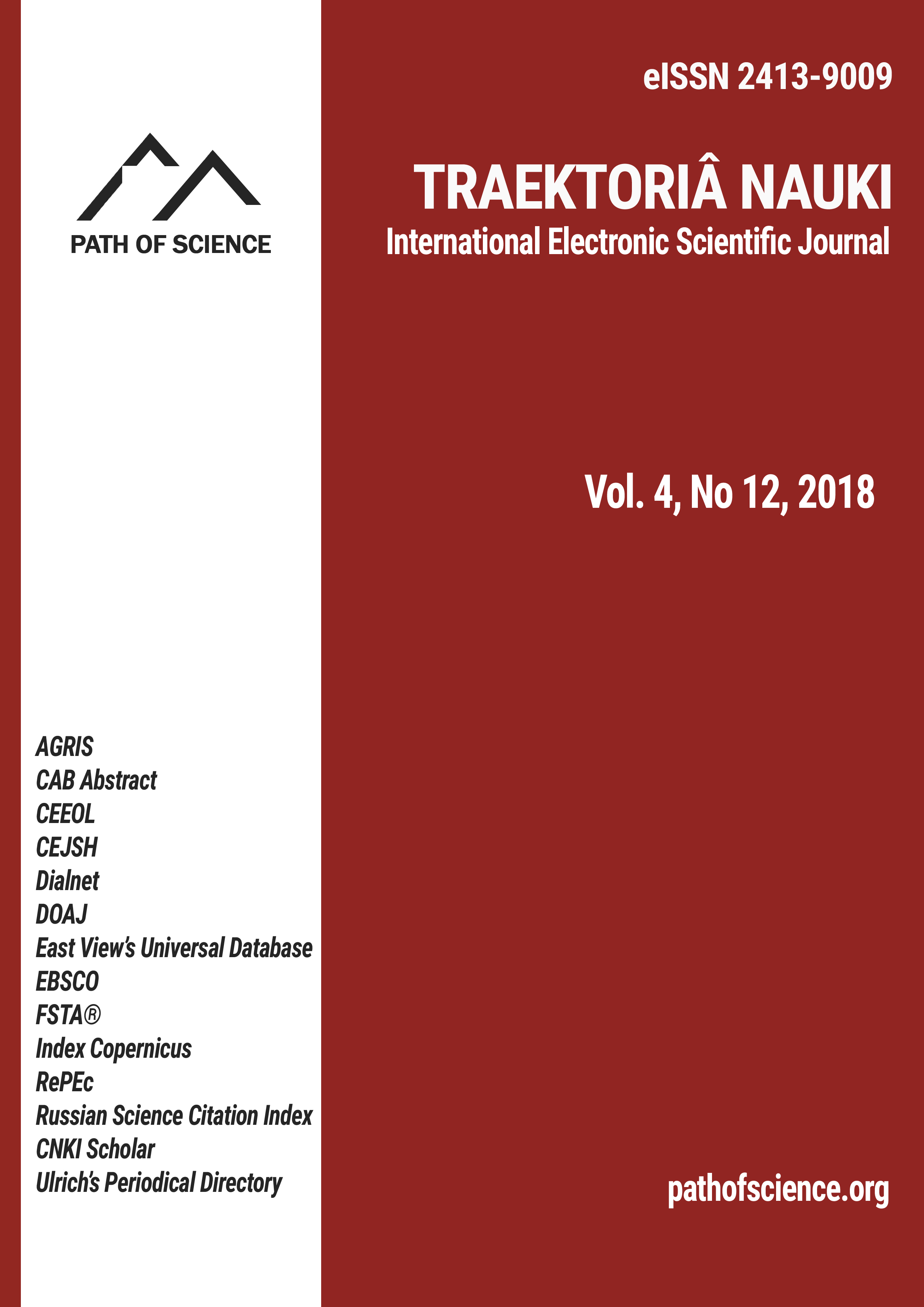
Trends in the modern world are always reflected in the language of every nation. The Ukrainian language is changing extremely fast, many words become archaisms, but new artifacts are emerging. This process is explained, among the other factors, by the extensive use of computer technologies, everyday virtual communication, which contributed to the introduction of a certain trend for the use of the English-language slang by the Ukrainians and the introduction of new taxons in the Ukrainian language. The purpose of the article is to reveal the influence of the English-language slang on the contemporary Ukrainian language.The theoretical significance of the work lies in the fact that its provisions and conclusions concretize and deepen the linguistic ideas about the relationship between languages, the way of introduction and translation of borrowings. The practical application of the research results is possible in the professional activities of translators, in the practice of translation and in the development of dictionaries of the modern Ukrainian language. The paper presents the examples of formation and use of slang words in the English-language sphere, outlines the use of polysemantic words or phrases both in the English-language discourse and in the speech of the Ukrainians. In the course of the study, it was found that, as a rule, slang gets into the vocabulary of the Ukrainian language by borrowing, more often – by scraping or transcribing, sometimes it is possible to use a descriptive translation or to add explanations to the text.The article gives the examples of the use of popular English-language slang in the Ukrainian discourse, in particular, in social networks, TV broadcasts, journalistic texts, or everyday conversations.
More...
In this paper we analysed the significance of autograph version of one part in Andrić’s story Priča o vezirovom slonu in genesis of its first printed edition. Correspondingly,we reconstruct of connection between Andrić’s autograph version, his notebooks and firstprinted edition of story. The semantical potentials of that version include the question aboutnarrative strategies in characterisation and position of narrator, and thematic basically thecategory of fear, evil, death and freedom.
More...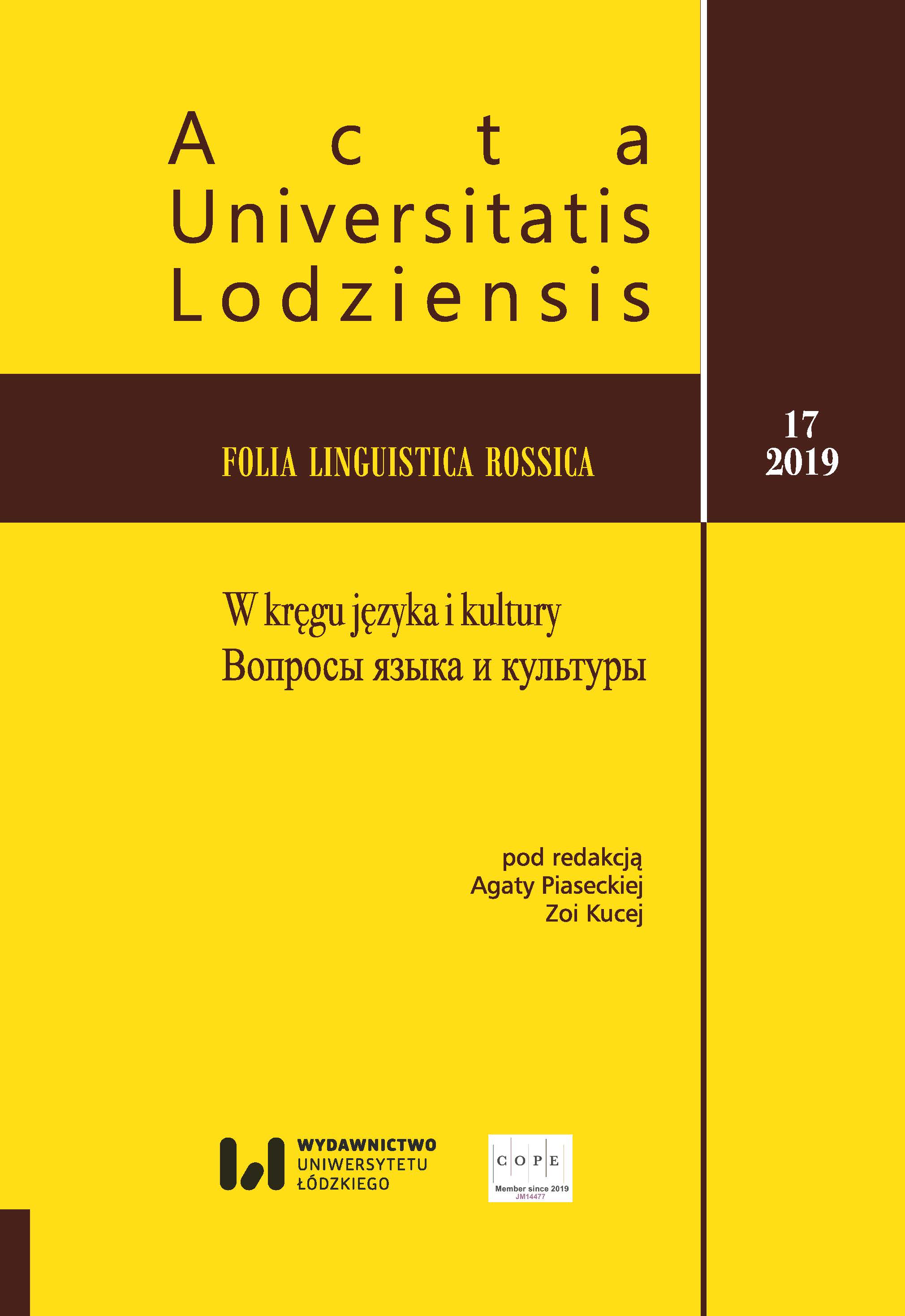
Over three hundred years of study and lexicographic parameterization of the lexical-semantic system of East Slavic languages has led to the emergence of a corpus of industry terminology of historical lexicology and related disciplines (synchronous lexicology, semasiology, etymology, dialectology, historical phonetics and grammar of closely related languages), which, until today, has not been reflected in any terminology dictionary.The article discusses a compiled corpus (1307 units) of historical lexicology terms and proposes ways to incorporate it in the industry terminological dictionary of an alphanumeric type, the compilation of which is based on the use of a system of linguistic methods and techniques, such as a continuous selection of terms and terminological notation from linguistic dictionaries, reference books, encyclopedias and scientific literature; methods of compiling the corpus of industry terminology of historical lexicology of East Slavic languages; the method of semantic analysis of the content of terms and a thematic analysis of the terminological corpus; methods of the development of terminological definitions, etc.The dictionary will consist of two parts: the first is an alphabetical-nested type dictionary, the other is a thematic list of cross-referenced terms. The corpus of terms is divided into 10 thematic groups: the theory of historical lexicology, Slavic languages, the history of East Slavic languages, etymology, lexicology, semasiology, word formation, morphology, dialectology, lexicography.The vocabulary piece in the first part will include the following areas: 1) the headword or terminological combination with accent and variable (synonymous) terms, if any; 2) the necessary grammatical and//or functional labels; 3) a brief etymology of the term; 4) derivatives related to the terminology of historical lexicology with a description of semantics; 5) definition (with reference to a previously published dictionary, if it had not been developed by the author of this dictionary); 6) language illustrations demonstrating the phenomenon named by the relevant term; 7) references to the other body of the vocabulary, i.e. an indication of the thematic group to which a term belongs. As examples, the article covers are two experimental dictionary entries “Achronology //panchronology” and “Root (words).”
More...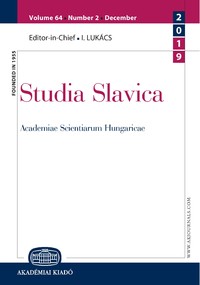
The present paper deals with the functioning of phraseological comparative constructions with biblical characters in dialects of East, West, and South Slavic languages. The charac- ters of the Holy Scripture include not only the nameless and named heroes of the Bible but also the Creator himself as well as supernatural beings that serve or oppose the Creator. The description involves comparative phraseological units with an adjective that derives from a character of the Bible. Most of the analyzed Slavic dialectal phraseological units are fixed in dictionaries. The description of comparative phraseological units (if possible) is carried out from the positions of structural and semantic modelling, which allows to identify the lexical variation of components in the dialects of the same language or in various languages. In some cases, the paper includes areal characteristics of comparative constructions. For this purpose, the author shows their parallels in other linguistic and dialect regions. As a result, the paper reveals both structural and semantic biblical universals and phraseological units with national specificity, i.e. similes that have no equivalents (literary or non-Slavic). There are units that are specific for some regions, for example, phraseological units containing microtoponyms such as geographical objects that are not widely known. The national and regional identity is manifested both at the level of figurative basis and at the level of non- equivalent comparativism since some subjects can be active in one language, while they are peripheral or lacunary in another one. In some cases, phraseological units are provided with cultural, historical, and etymol- ogical comments which reveal not only the biblical and religious roots but also reflect the ancient mythological representations of the Slavs. The author gives an explanation to the meaning of similes and their components. The Old and New Testaments are a common element of the spiritual culture of Chris- tians so the comparison reveals the similarity and repetition of comparative units, directly or indirectly related to the names of the characters of the Bible, or structural and semantic models in a particular area. At the same time, the phraseological units genetically ascending to the Bible show a quite large differentiation, demonstrating the peculiarity of the recep- tion of biblical images by the Slavs, the unequal interest in them. Although the very name of the biblical character is often international, set similes containing it are not always the same. This is usually the case for pseudo-biblical phraseological units that have no direct links to the character of the Bible; they are usually inherent in folk speech and are often jokingly ironic. This is particularly evident in dialects.
More...
The two characteristics of the passive voice found in the North Russian dialect and in other Circum-Baltic languages, the accusative case of the patient or theme as an argument of a verb with passive morphology and intransitive verbs passivized raise a number of related questions. The author of the present paper explores the issues under discussion from an areal-historical perspective, concluding that the aforementioned languages have a tendency for the agent to be the same element as the subject and the patient or theme to be the same element as the (direct) object of the sentence. In the North Russian dialect, we can see an example where the above fact holds true irrespective of whether the verb has an active or a passive morphology as the theme of the sentence assumes the accusative case regardless of whether it is an argument of a verb in the active or in the passive voice. The question as to what lexical elements can function as subjects is itself interesting. Moreover, there seems to be a correlation between what level of abstraction the syntactic category of subject has reached in a language and the existence of a pure passive mean- ing. The less abstract the category of subject is, as in case of Circum-Baltic languages, the farther structures with a passive morphology seem to be from a pure passive meaning. In languages such as English, however, where virtually any noun can function as a subject, there seems to be a pure passive meaning and there is only one morphological way of form- ing passive sentences. The nature of linguistic similarities found in genetically less related languages spoken in the same area has been given a number of varied accounts. The most salient of them ap- pears to be B. Drinka’s explanation based on the influence of Western European languages on ones spoken in the East of the area where once the Hanseatic League existed in the middle ages and I. Seržant’s theory concerning the foregrounding of the agent as passive structures with a stative interpretation gradually assumed a dynamic one. In fact, participles in the North Russian dialect ending in -n / -t can express a dynam- ic, that is, eventive interpretation with a perfect meaning and can even co-occur with the -sja / -s’ postfix, the latter phenomenon being absolutely unimaginable in Standard Russian, where the two affixes are in complementary distribution. The author assumes that the topic should be studied from the perspective of sociology and cultural anthropology as well since linguistic similarities and differences often reflect similarities and differences in thinking beyond the realm of linguistics.
More...